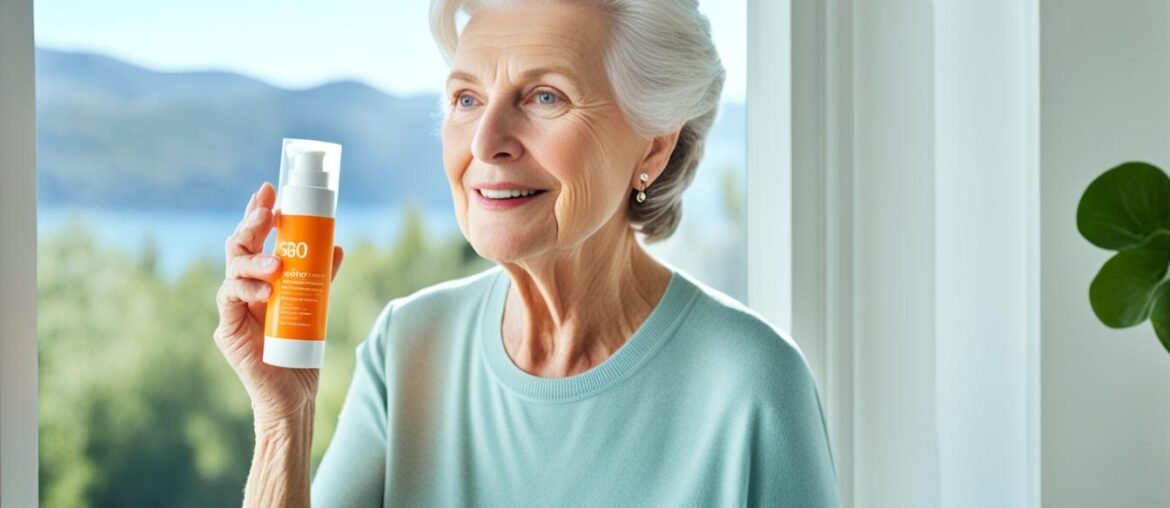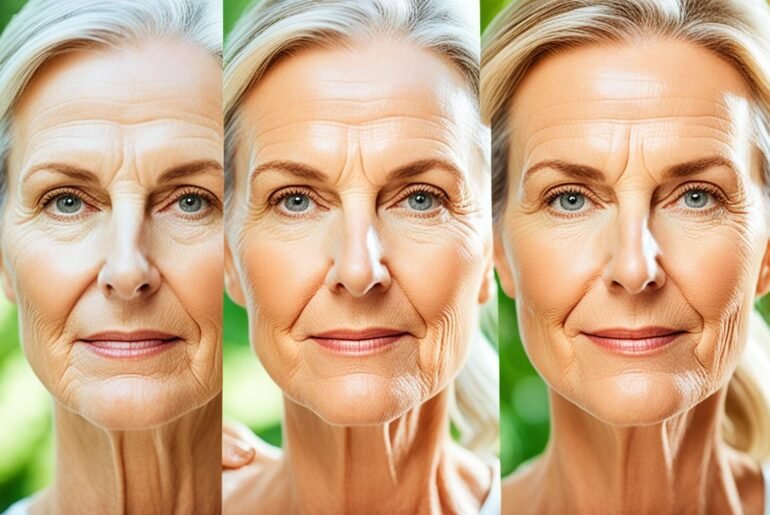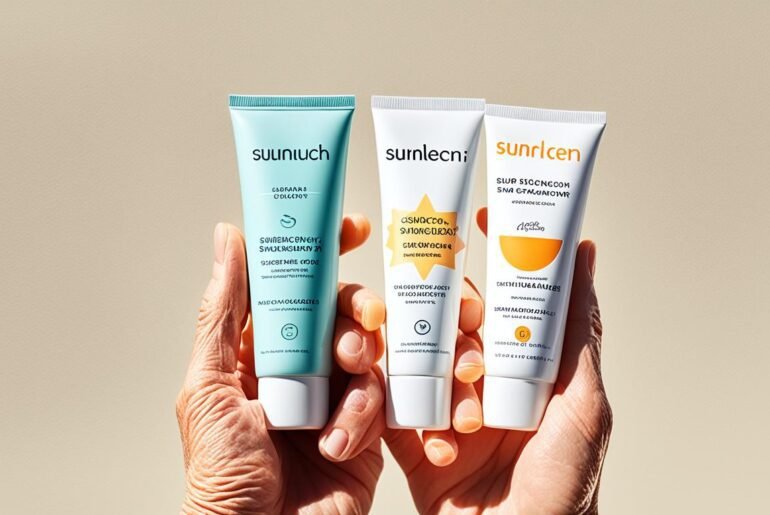Did you know that regular sunscreen use can slow down the skin’s aging process? According to numerous studies, people who use broad-spectrum sunscreen on a daily basis experience 24 percent less skin aging than those who use sunscreen only intermittently. Even if you start using sunscreen in your 40s or 50s, it can still reduce the signs of aging. Sun exposure not only increases the risk of skin cancer but also depletes collagen, dilates blood vessels, and causes pigmentation changes in the skin.
Protecting your skin from the harmful effects of the sun is essential, especially as you age. In this article, I will provide expert advice on sun protection for aging skin, including the best sunscreens for mature skin, tips for protecting aging skin from sun damage, and anti-aging tips for sun protection. By following these recommendations, you can keep your skin healthy, youthful, and protected from the sun’s harmful rays.
Key Takeaways:
- Regular sunscreen use can slow down the skin’s aging process.
- Starting sunscreen application in your 40s or 50s can still reduce the signs of aging.
- Sun exposure increases the risk of skin cancer and causes collagen depletion, blood vessel dilation, and pigmentation changes in the skin.
- Protecting your skin from the sun is essential for maintaining its health and youthfulness.
- Expert advice on sun protection for aging skin includes using the best sunscreens for mature skin, following tips to prevent sun damage, and adopting anti-aging practices.
The Importance of Sunscreen for Aging Skin
Regular use of sunscreen is essential for protecting aging skin from the damaging effects of the sun. The sun’s UV radiation is the primary cause of skin aging, leading to wrinkles, fine lines, age spots, and other signs of aging. By incorporating sunscreen into your daily skincare routine, you can prevent these visible signs of aging and maintain youthful-looking skin.
In addition to its anti-aging benefits, sunscreen also plays a vital role in reducing the risk of skin cancer. As individuals age, their risk of developing skin cancer increases, making sun protection even more crucial. By shielding your skin from harmful UV rays, sunscreen helps minimize the risk of skin cancer, preserving your overall health and well-being.
The American Academy of Dermatology recommends using sunscreen every day, regardless of the weather. UV rays can penetrate clouds and cause damage even on cloudy days. It is important to choose a broad-spectrum sunscreen that offers protection against both UVB and UVA rays. UVB rays primarily cause sunburns, while UVA rays penetrate deeper into the skin, contributing to aging effects and skin cancer development.
To ensure optimal sun protection, select a sunscreen with a minimum SPF of 30. An SPF of 30 blocks approximately 97% of UV rays, providing adequate protection for your skin. Remember to apply sunscreen generously, covering all exposed areas of your body, including your face, neck, and hands.
By prioritizing sunscreen use, you can safeguard your skin from the harmful effects of the sun, maintain a youthful appearance, and protect yourself against skin cancer. Make sunscreen an indispensable part of your skincare regimen to support the health and vitality of your aging skin.
| Benefits of Sunscreen for Aging Skin |
|---|
| Prevents wrinkles, fine lines, and age spots |
| Reduces the risk of skin cancer |
| Maintains a youthful appearance |
| Protects against UV radiation damage |
| Preserves overall skin health |
How UV Rays Damage Aging Skin
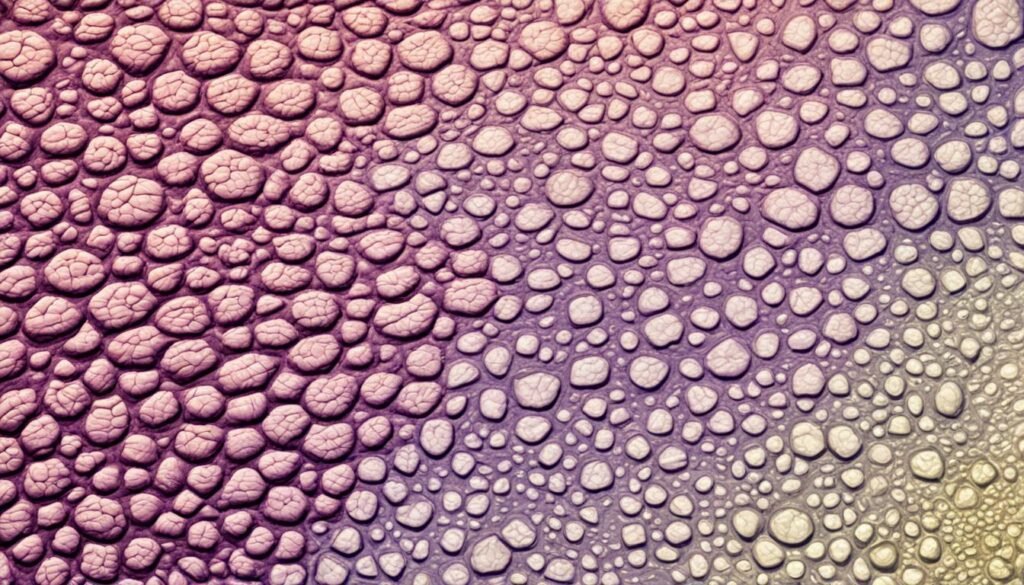
UV rays, both UVB and UVA, can cause significant damage to aging skin. UVB rays primarily affect the top layer of the skin, leading to sunburns. The harmful effects of UVB rays are well-known and easily recognizable, often manifesting as redness, pain, and peeling after excessive sun exposure.
On the other hand, UVA rays can penetrate deeper into the skin and have more long-term effects. They contribute to the premature aging of the skin, including the development of wrinkles, brown spots, and visible blood vessels. These signs of aging are particularly troublesome for individuals with aging skin, who are already more prone to these issues.
Over time, prolonged exposure to UV radiation damages the cells on the top layer of the skin, leading to the redness, roughness, and scaliness associated with actinic keratosis, a precancerous condition. UV exposure also depletes collagen, the protein responsible for keeping the skin firm and supple. Collagen loss contributes to the formation of wrinkles and sagging skin, making individuals appear older than their actual age.
In addition, UV rays cause blood vessels to dilate, resulting in a flushed appearance and visible veins. Increased pigmentation in the form of age spots or sunspots is another commonly observed effect of sun-induced skin damage. Moreover, UV radiation leads to the formation of elastotic material, which causes the skin to become thick, leathery, and blotchy.
It is crucial to understand the damaging effects of UV rays on aging skin as it emphasizes the need for effective sun protection. By adopting preventative measures and incorporating daily sunscreen use into a skincare routine, individuals can minimize the impact of UV radiation on their skin, maintain a youthful appearance, and reduce the risk of developing skin cancer.
Sunscreen and Skin Aging
Regular use of sunscreen is crucial for maintaining the youthful appearance of aging skin. Sunscreen provides protection against the harmful effects of UV radiation, which can accelerate skin aging. By incorporating sunscreen into your daily skincare routine, you can effectively combat the signs of aging and maintain the overall health and beauty of your skin.
Studies have shown that individuals who use sunscreen every day, even later in life, experience reduced signs of skin aging compared to those who use sunscreen intermittently. The sun’s UV rays contribute to collagen depletion, blood vessel dilation, pigmentation changes, and the formation of elastotic material, all of which can result in a more aged appearance.
To prevent these effects, it is recommended to use a broad-spectrum sunscreen with a minimum of SPF 30. Broad-spectrum sunscreens protect against both UVB and UVA rays, shielding the skin from sunburn, wrinkles, fine lines, age spots, and other signs of aging.
Regular sunscreen use not only prevents existing signs of aging from worsening but also helps to slow down the overall aging process of the skin. By creating a barrier between the skin and harmful UV radiation, sunscreen helps to preserve collagen and elastin, maintaining the skin’s elasticity and firmness.
The regular use of broad-spectrum sunscreen with an SPF of 30 or higher is vital for preventing skin aging and maintaining the health and beauty of mature skin.
Protecting your skin from the sun’s damaging rays is essential for both aesthetic and health reasons. In addition to sunscreen, it is important to incorporate other sun protection measures into your routine, such as seeking shade, wearing protective clothing, and avoiding excessive sun exposure during peak hours.
By prioritizing sun protection, you can effectively reduce the signs of aging in your skin and ensure that it remains healthy and vibrant for years to come.
Other Sun Protection Measures for Aging Skin
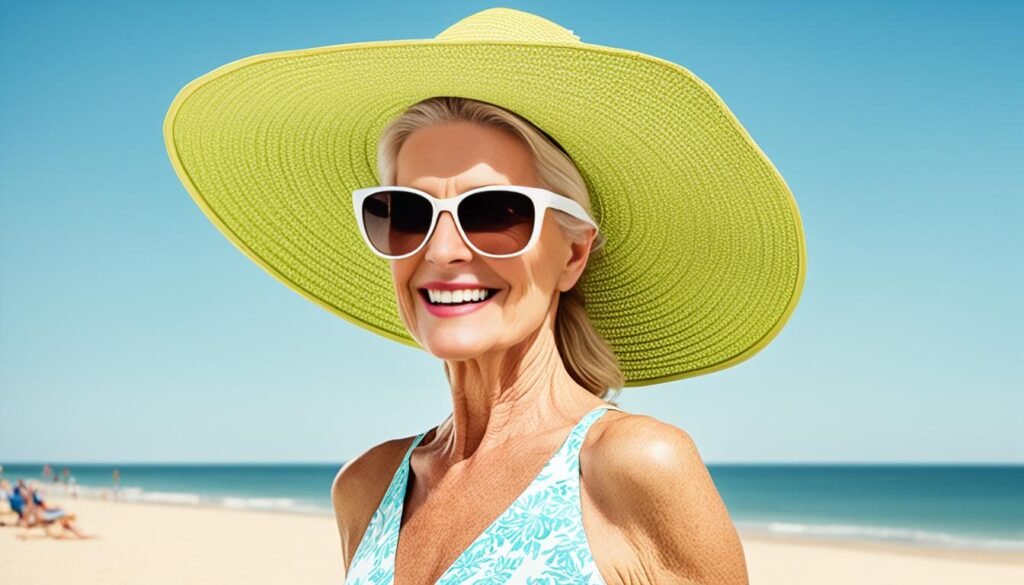
In addition to regular sunscreen use, there are other measures that individuals with aging skin can take to protect themselves from the damaging effects of the sun. These include:
- Staying out of the sun during peak hours: Avoiding direct sun exposure between 10 am and 4 pm when the UV index is highest can help minimize the harmful effects of UV radiation on the skin.
- Wearing protective clothing: Covering exposed skin with protective clothing, such as long sleeves, pants, wide-brimmed hats, and sunglasses, can provide an extra layer of defense against the sun’s rays.
- Seeking shade: When spending time outdoors, finding shade under an umbrella, tree, or other protective structures can reduce sun exposure and lower the risk of sunburn and skin damage.
- Avoiding tanning beds and sunlamps: Artificial tanning devices emit UV radiation that can be just as damaging to the skin as natural sunlight. It is best to avoid using tanning beds and sunlamps altogether.
By following these sun protection tips, older individuals can significantly reduce their risk of sunburn, skin damage, and skin cancer.
| Sun Protection Measure | Description |
|---|---|
| Staying out of the sun during peak hours | Avoiding sun exposure between 10 am and 4 pm when the UV index is highest can minimize the risk of sunburn and skin damage. |
| Wearing protective clothing | Covering exposed skin with long sleeves, pants, hats, and sunglasses provides physical protection against harmful UV rays. |
| Seeking shade | Finding shade under an umbrella or other coverings reduces direct sun exposure and lowers the risk of sunburn. |
| Avoiding tanning beds and sunlamps | Artificial tanning devices emit UV radiation and should be avoided to prevent skin damage and the risk of skin cancer. |
Advances in Skin Care for Aging Skin
As advancements in the field of dermatology continue to evolve, so do the options for combating the visible signs of aging in the skin. These breakthroughs provide individuals with innovative treatments that specifically target the effects of sun damage, such as fine lines, brown spots, and broken blood vessels.
One of the most effective treatments for sun-damaged skin is the use of topical medications. These medications, containing ingredients such as retinoids and antioxidants, help to reduce the appearance of wrinkles and hyperpigmentation, promoting a smoother and more youthful complexion.
Besides topical medications, light therapies have gained recognition for their ability to rejuvenate aging skin. Phototherapy techniques, including intense pulsed light (IPL) and LED light therapy, deliver targeted wavelengths of light to the skin, stimulating collagen production and reducing the appearance of sun damage and discoloration.
In some cases, laser treatments may be recommended to address more severe signs of sun damage. Laser resurfacing procedures, such as fractional laser therapy, resurface the skin by removing damaged layers and promoting the growth of new, healthier skin cells. This can lead to a significant reduction in fine lines, wrinkles, and uneven skin tone.
It is important to note that while these treatments can effectively improve the appearance of sun-damaged skin, regular sunscreen use remains a vital component of any anti-aging skincare routine. Sunscreen helps to prevent further sun damage, protecting the skin from harmful UV rays and reducing the risk of skin cancer. By combining advanced skincare treatments with diligent sun protection, individuals can achieve optimal results in their journey towards healthier, more youthful-looking skin.
| Treatment | Targeted Concerns | Expected Results |
|---|---|---|
| Topical Medications | Wrinkles, hyperpigmentation | Reduced appearance of fine lines and discoloration, improved skin texture |
| Light Therapies | Sun damage, uneven skin tone | Stimulated collagen production, improved skin texture and tone |
| Laser Treatments | Deep wrinkles, severe sun damage | Significant reduction in wrinkles, improved skin texture and tone |
Choosing the Right Sunscreen for Aging Skin
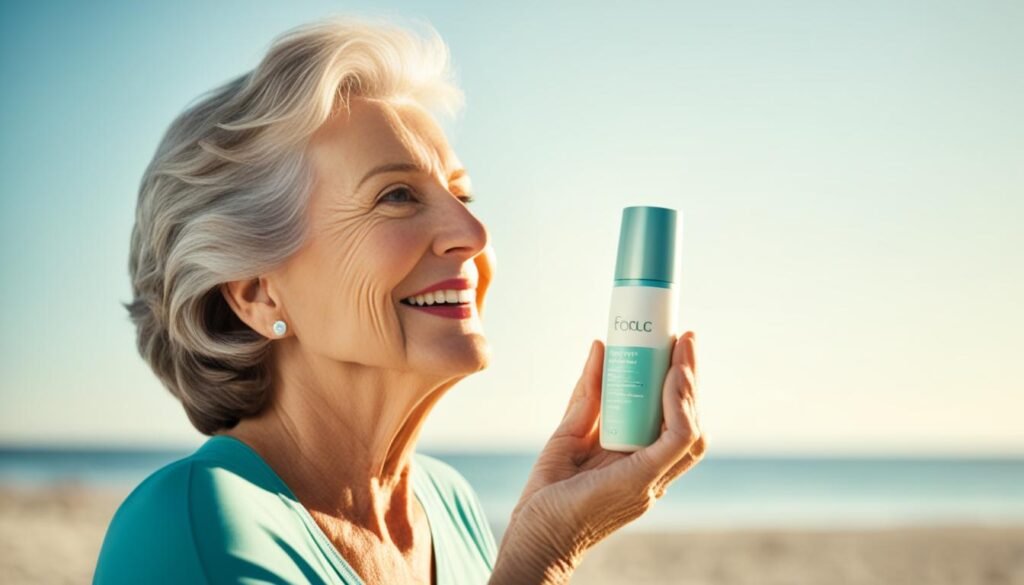
When it comes to selecting sunscreen for mature skin, several factors should be considered to ensure the best protection. By choosing the right product, you can effectively safeguard your skin from the harmful effects of the sun, such as wrinkles, age spots, and an increased risk of skin cancer.
One of the most important factors to consider is to opt for a sunscreen that provides broad-spectrum protection against both UVB and UVA rays. While UVB rays primarily cause sunburns, UVA rays penetrate deeper into the skin and contribute to premature aging. By using a broad-spectrum sunscreen, you can shield your skin from both types of UV radiation and minimize the associated damage.
Additionally, it is recommended to select a sunscreen with a minimum sun protection factor (SPF) of 30. This level of SPF ensures adequate protection against harmful UV rays. Remember that higher SPF values do not necessarily offer significantly better protection, so an SPF of 30 is generally considered sufficient.
For individuals with aging skin, it may be beneficial to choose sunscreen formulations specifically designed for mature skin. These products often contain additional ingredients that provide moisture and nourishment, helping to combat the dryness and other age-related changes that older skin may experience. These specialized formulations can contribute to maintaining the overall health and appearance of your skin.
Consider Personal Preferences
Aside from the technical aspects, it is also essential to consider personal preferences when selecting a sunscreen. The texture, feel, and scent of the product can impact your willingness to use it consistently. It is crucial to choose a sunscreen that you enjoy applying, as regular and proper use is key to effective sun protection.
Some sunscreens are oil-based, while others are water-based or gel-based, offering different textures and finishes. Experimenting with different formulations can help you find one that feels comfortable on your skin. Additionally, some sunscreens are fragrance-free, while others have a pleasant scent. Finding a sunscreen with a scent that you enjoy can make the application process more enjoyable.
Remember, the best sunscreen is the one that you will use consistently. Taking into account both the technical specifications and personal preferences will help you choose a sunscreen that suits you best, ensuring that you protect your aging skin effectively.
The Benefits of Daily Sunscreen Use
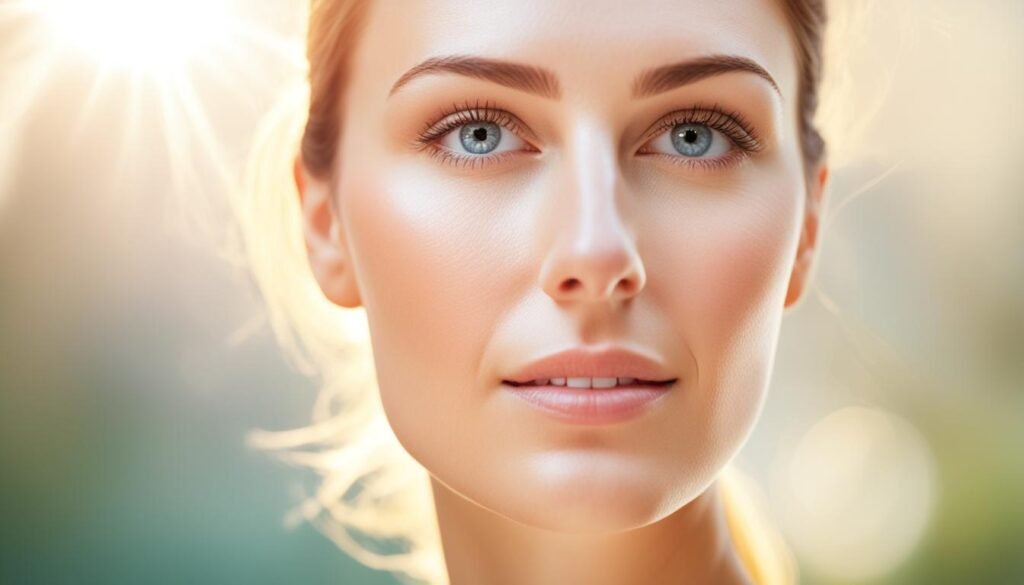
Using sunscreen every day offers numerous benefits for aging skin. Daily sunscreen application can help prevent wrinkles, fine lines, age spots, and other signs of aging caused by sun exposure. It also reduces the risk of skin cancer, which becomes increasingly important as individuals age and their risk of developing skin cancer increases.
Additionally, regular sunscreen use can contribute to overall skin health by protecting against environmental damage and preserving the skin’s youthful appearance. Sunscreen acts as a barrier against harmful UV rays that can penetrate the skin, leading to collagen breakdown and pigmentation changes. By applying sunscreen daily, you can protect your skin from these damaging effects and maintain a more youthful complexion.
Making sunscreen a part of your daily skincare routine is a simple and effective way to maintain the health and beauty of aging skin. By incorporating sunscreen into your daily regimen, you can safeguard your skin against the harmful effects of the sun and enjoy the benefits of a healthier, more radiant complexion.
Remember, prevention is key when it comes to skin health, and sunscreen is your best defense against premature aging and skin cancer. Start using sunscreen daily and reap the benefits of protected, youthful-looking skin.
| Benefits of Daily Sunscreen Use | Explanation |
|---|---|
| Prevents wrinkles and fine lines | Sunscreen helps protect the skin from the damaging effects of UV rays, preventing the development of wrinkles and fine lines. |
| Reduces the risk of age spots | Regular sunscreen use can help prevent the formation of age spots, which are caused by sun damage. |
| Decreases the risk of skin cancer | Sunscreen acts as a barrier against harmful UV rays, reducing the risk of developing skin cancer. |
| Preserves the skin’s youthful appearance | By protecting against environmental damage, sunscreen helps preserve the skin’s youthful appearance and radiance. |
| Minimizes the effects of sun-induced aging | Regular sunscreen use can help minimize the visible signs of aging caused by sun exposure. |
The Role of Sunscreen in Overall Skin Health
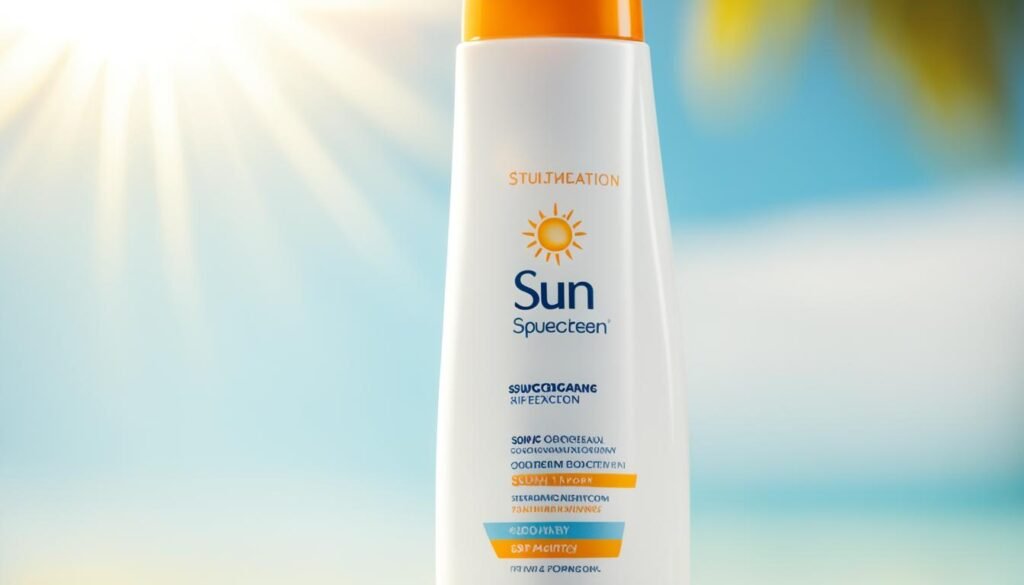
Sunscreen plays a vital role in maintaining the overall health of the skin, particularly as it ages. It provides essential protection against the harmful effects of UV radiation, which can cause significant damage to the skin and impact its long-term well-being.
UV radiation, consisting of both UVB and UVA rays, can lead to collagen depletion, blood vessel dilation, pigmentation changes, and the formation of elastotic material in the skin. These damaging effects can result in premature aging, such as wrinkles, fine lines, age spots, and a blotchy appearance.
By regularly applying sunscreen with a broad-spectrum formula, individuals can effectively shield their skin from these harmful UV rays. Sunscreen acts as a barrier, preventing the penetration of UV radiation and reducing the risk of developing skin cancer.
Incorporating sunscreen into a daily skincare routine is crucial for maintaining optimal skin health. Alongside other skincare practices like moisturizing and proper cleansing, sunscreen offers a foundational level of protection that helps preserve the skin’s structural integrity.
Here’s why sunscreen is so essential for overall skin health:
- Protection against collagen depletion: UV radiation damages collagen, a structural protein that gives the skin its strength and elasticity. By wearing sunscreen, individuals can help prevent the breakdown of collagen, which keeps the skin firm and youthful-looking.
- Prevention of blood vessel dilation: Prolonged sun exposure can cause blood vessels in the skin to dilate, leading to redness, visible veins, and a flushed appearance. Regular sunscreen use can minimize the risk of blood vessel dilation, preserving an even skin tone.
- Reduction of pigmentation changes: UV radiation can trigger increased pigmentation in the form of dark spots, uneven skin tone, and melasma. Applying sunscreen consistently helps prevent these pigmentation changes and promotes a more uniform complexion.
- Minimization of elastotic material formation: Elastotic material, a hallmark of sun-damaged skin, is responsible for a rough texture and uneven skin surface. Sunscreen plays a crucial role in minimizing the formation of elastotic material, resulting in smoother, healthier-looking skin.
- Lowered risk of skin cancer: Sunscreen is an effective preventative measure against skin cancer, one of the most common types of cancer. By reducing UV radiation exposure, regular sunscreen use helps decrease the risk of developing skin cancer, including both melanoma and non-melanoma types.
Protecting the skin with sunscreen is a fundamental step towards maintaining overall well-being. By incorporating sunscreen into daily skincare routines, individuals can safeguard their skin from harmful UV rays, prevent premature aging, and minimize the risk of skin cancer.
Conclusion
Sun protection is crucial for maintaining the health and youthfulness of aging skin. The damaging effects of UV radiation can cause wrinkles, fine lines, age spots, and a blotchy appearance. To prevent these signs of aging and reduce the risk of skin cancer, it is important to incorporate sun protection measures into your daily skincare routine.
Regular use of broad-spectrum sunscreen with an SPF of 30 or higher is highly recommended. This type of sunscreen provides protection against both UVB and UVA rays, which are responsible for skin damage and premature aging. By applying sunscreen every day, you can minimize the harmful effects of sun exposure and maintain the overall health of your skin.
In addition to sunscreen, it is advisable to wear protective clothing that covers exposed skin, seek shade during peak sun hours, and avoid tanning beds and sunlamps. These extra precautions can further minimize sun damage and protect your skin from harmful UV rays.
Advancements in skincare treatments also offer options for addressing specific aging concerns. Consulting with a dermatologist can help you determine the best treatment options for your individual needs. However, it is important to note that sunscreen remains an essential component of any skincare regimen to prevent further sun damage.
FAQ
What is the importance of sunscreen for aging skin?
Sunscreen plays a crucial role in protecting aging skin from the damaging effects of the sun. UV radiation from the sun is the primary cause of skin aging, and regular sunscreen use can help prevent wrinkles, fine lines, age spots, and other signs of aging. It also reduces the risk of skin cancer, which is especially important for aging individuals who may have a higher risk.
How do UV rays damage aging skin?
UV rays, both UVB and UVA, can cause significant damage to aging skin. UVB rays primarily affect the top layer of the skin, leading to sunburns. UVA rays penetrate deeper into the skin and can cause aging effects, such as the development of wrinkles, brown spots, and visible blood vessels. Prolonged exposure to UV radiation damages the cells on the top layer of the skin, leading to redness, roughness, and scaliness associated with actinic keratosis. UV exposure also depletes collagen, dilates blood vessels, increases pigmentation in the skin, and causes the formation of elastotic material, resulting in a blotchy and aged appearance.
How does sunscreen help with skin aging?
Regular use of sunscreen is one of the best ways to combat skin aging. Sunscreen protects against the harmful effects of UV radiation, including collagen depletion, blood vessel dilation, pigmentation changes, and the formation of elastotic material. Studies have shown that people who use sunscreen every day, even those who start in their 40s and 50s, experience reduced signs of skin aging compared to intermittent sunscreen users. Sunscreen not only prevents existing signs of aging from worsening but also helps to slow down the overall aging process of the skin.
What are some other sun protection measures for aging skin?
In addition to regular sunscreen use, other measures that individuals with aging skin can take to protect themselves from the damaging effects of the sun include staying out of the sun during peak hours, wearing protective clothing that covers exposed skin, seeking shade during outdoor activities, and avoiding tanning beds and sunlamps. These precautions can help minimize sun exposure and reduce the risk of sunburn, skin damage, and skin cancer.
What are some advances in skin care for aging skin?
There have been significant advancements in skin care that can help minimize the visible signs of aging caused by sun exposure. Topical medications, light therapies, and laser treatments are among the options available for reducing fine lines, brown spots, and broken blood vessels. These treatments are designed to target specific skin concerns and can be tailored to individual needs. For individuals with pre-existing sun damage, dermatologists can provide guidance on the best treatment options. However, it is important to note that while these treatments can improve the appearance of the skin, regular sunscreen use remains essential to prevent further sun damage.
How should I choose the right sunscreen for aging skin?
When selecting sunscreen for aging skin, it is important to choose a product that offers broad-spectrum protection against both UVB and UVA rays. Sunscreens that only provide UVB protection do not adequately protect against skin cancer and may result in prolonged exposure to UVA rays. A minimum SPF of 30 is recommended to ensure adequate sun protection. Additionally, individuals with aging skin may benefit from sunscreen formulations that are specifically designed for mature skin, as these often offer added ingredients that provide moisture and nourishment. It is also important to consider personal preferences, such as the texture and feel of the sunscreen, to ensure regular and consistent use.
What are the benefits of daily sunscreen use?
Using sunscreen every day offers numerous benefits for aging skin. Daily sunscreen application can help prevent wrinkles, fine lines, age spots, and other signs of aging caused by sun exposure. It also reduces the risk of skin cancer, which becomes increasingly important as individuals age and their risk of developing skin cancer increases. Additionally, regular sunscreen use can contribute to overall skin health by protecting against environmental damage and preserving the skin’s youthful appearance.
What is the role of sunscreen in overall skin health?
Sunscreen plays a vital role in maintaining the overall health of the skin, particularly as it ages. It protects against the harmful effects of UV radiation, which can cause widespread damage to the skin, including collagen depletion, blood vessel dilation, pigmentation changes, and the formation of elastotic material. By preventing these damaging effects, sunscreen helps to preserve the skin’s structural integrity and reduces the risk of developing skin cancer. Alongside other skincare practices such as moisturizing and proper cleansing, incorporating sunscreen into a daily skincare routine is essential for maintaining optimal skin health.
What are some tips for sun protection for aging skin?
In addition to using sunscreen, there are other measures that individuals with aging skin can take to protect themselves from the damaging effects of the sun. These include staying out of the sun during the peak hours when the UV index is highest, wearing protective clothing that covers exposed skin, such as long sleeves and hats, seeking shade during outdoor activities, and avoiding tanning beds and sunlamps. These precautions can help minimize sun exposure and reduce the risk of sunburn, skin damage, and skin cancer.
What is the best sunscreen for aging skin?
When choosing a sunscreen for aging skin, it is important to select a product that offers broad-spectrum protection against both UVB and UVA rays. Additionally, a minimum SPF of 30 is recommended to ensure adequate sun protection. Personal preferences, such as the texture and feel of the sunscreen, should also be considered to ensure regular and consistent use. Individuals with aging skin may benefit from sunscreen formulations that are specifically designed for mature skin, as these often offer added ingredients that provide moisture and nourishment.
What is the conclusion about sun protection for aging skin?
Sun protection is essential for maintaining the health and youthfulness of aging skin. Sunscreen plays a crucial role in protecting aging skin from the damaging effects of the sun, including wrinkles, fine lines, age spots, and skin cancer. In addition to regular sunscreen use, other sun protection measures such as wearing protective clothing and seeking shade are recommended. Advances in skincare treatments can also help minimize the visible signs of aging caused by sun exposure. Incorporating sun protection into a daily skincare routine is a simple and effective way to maintain the health and beauty of aging skin.

